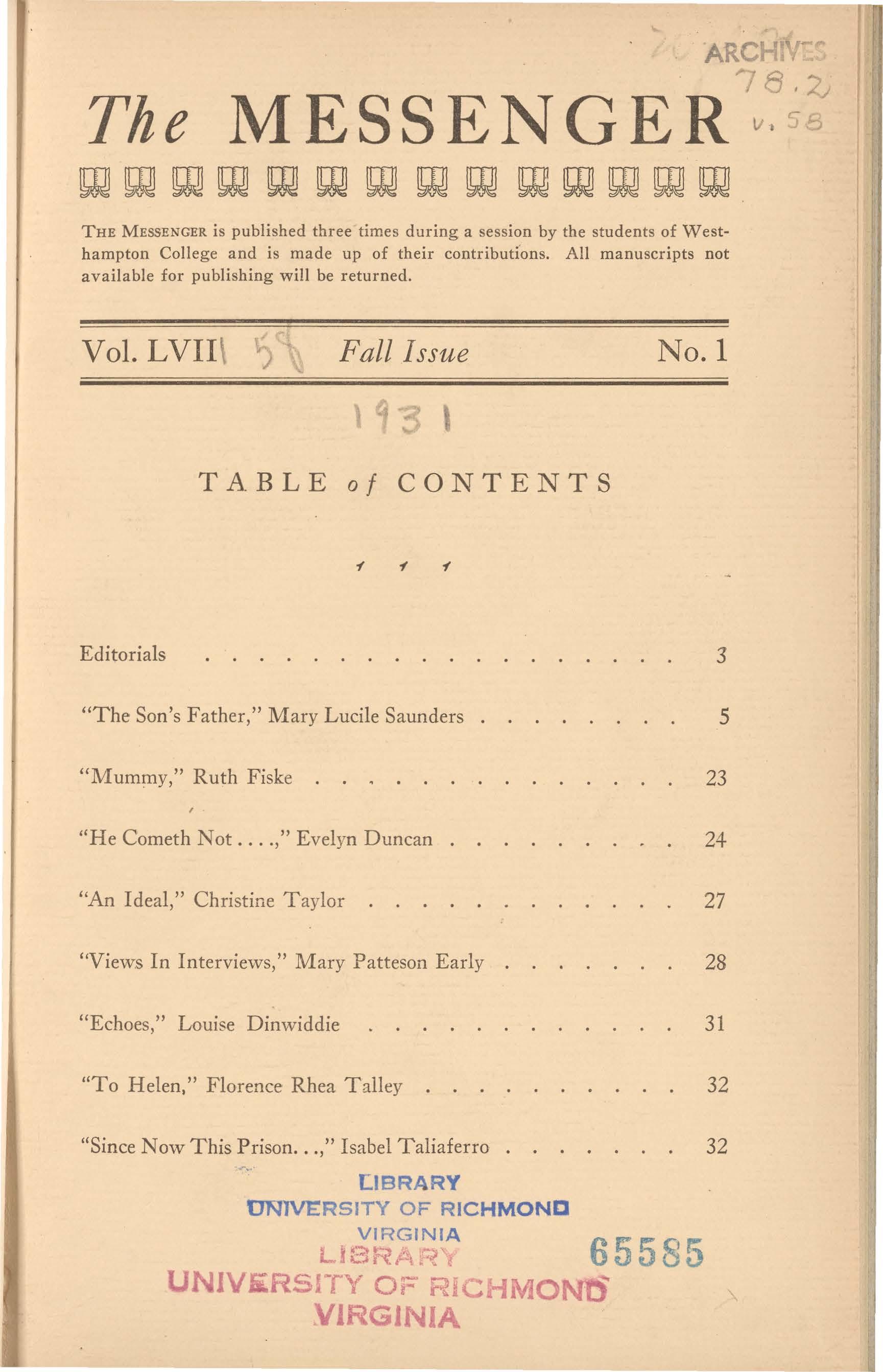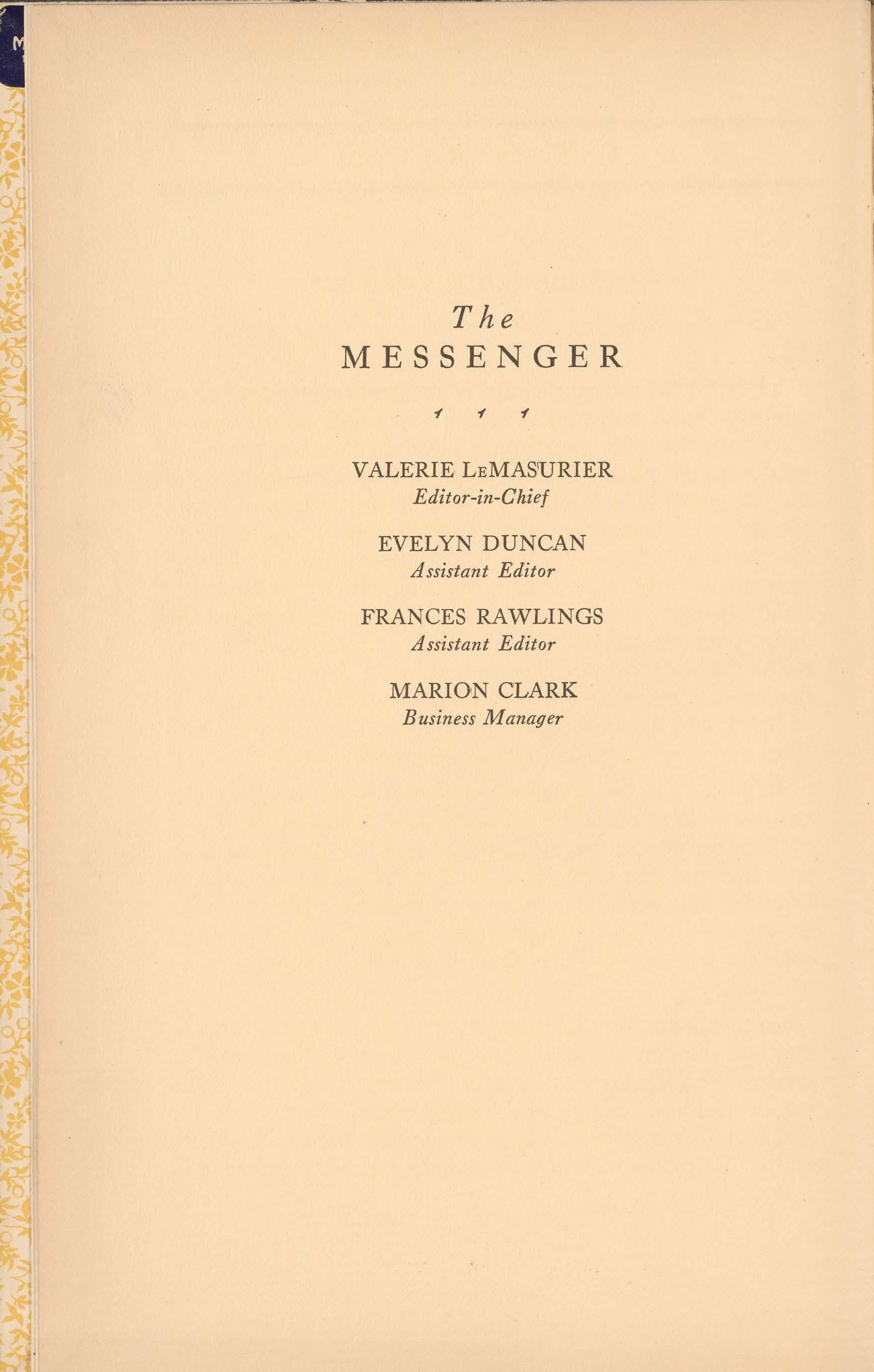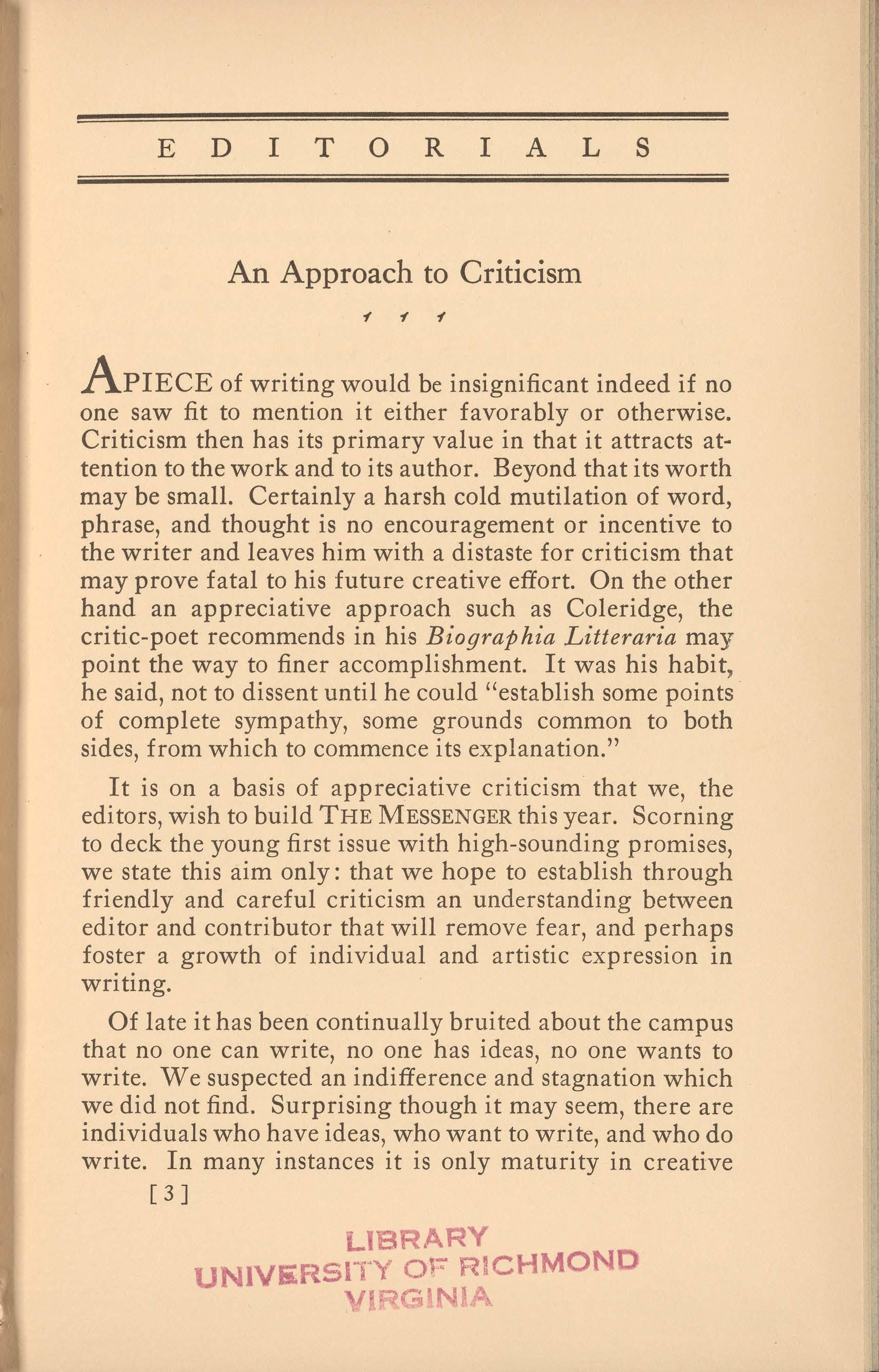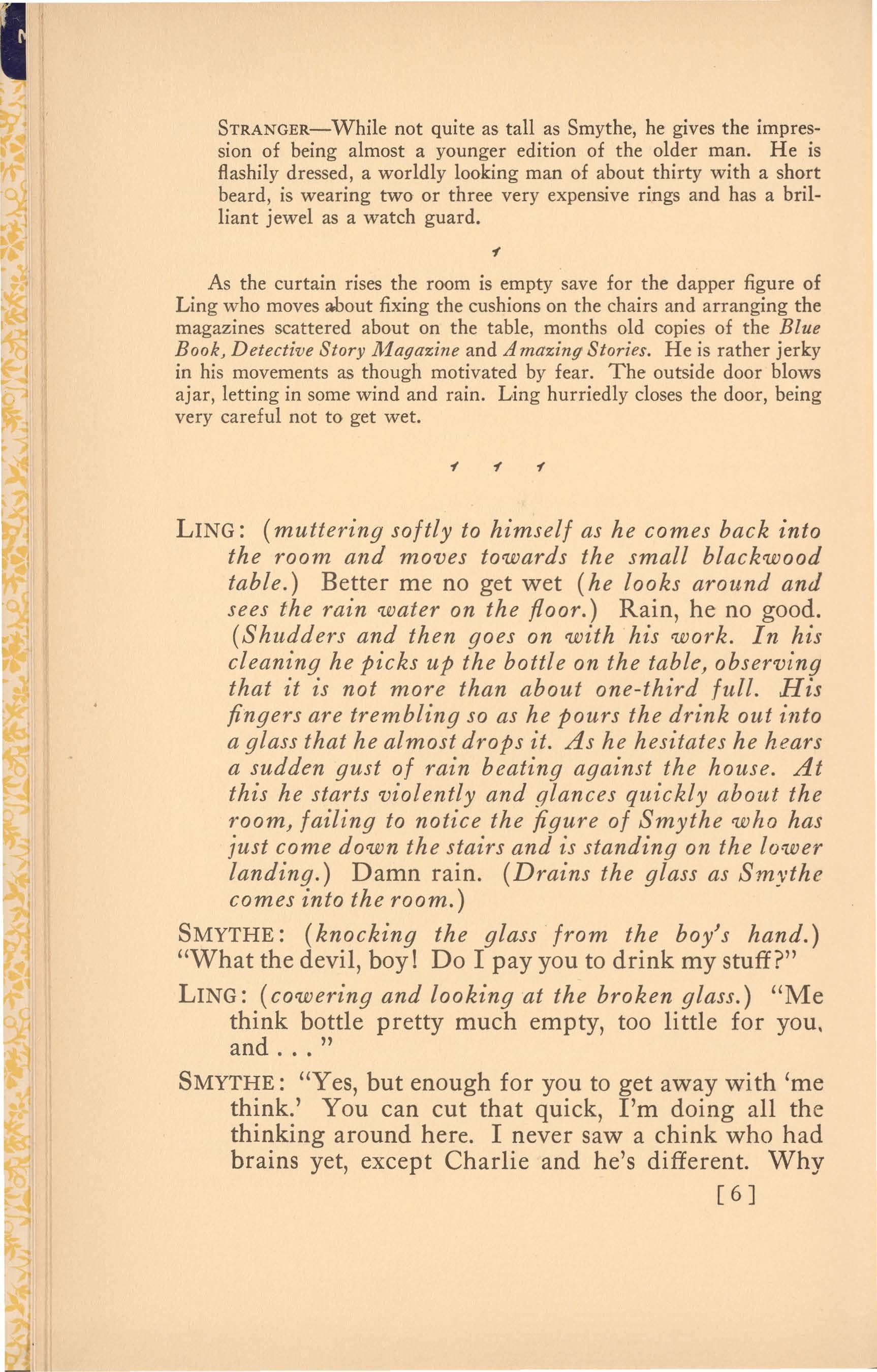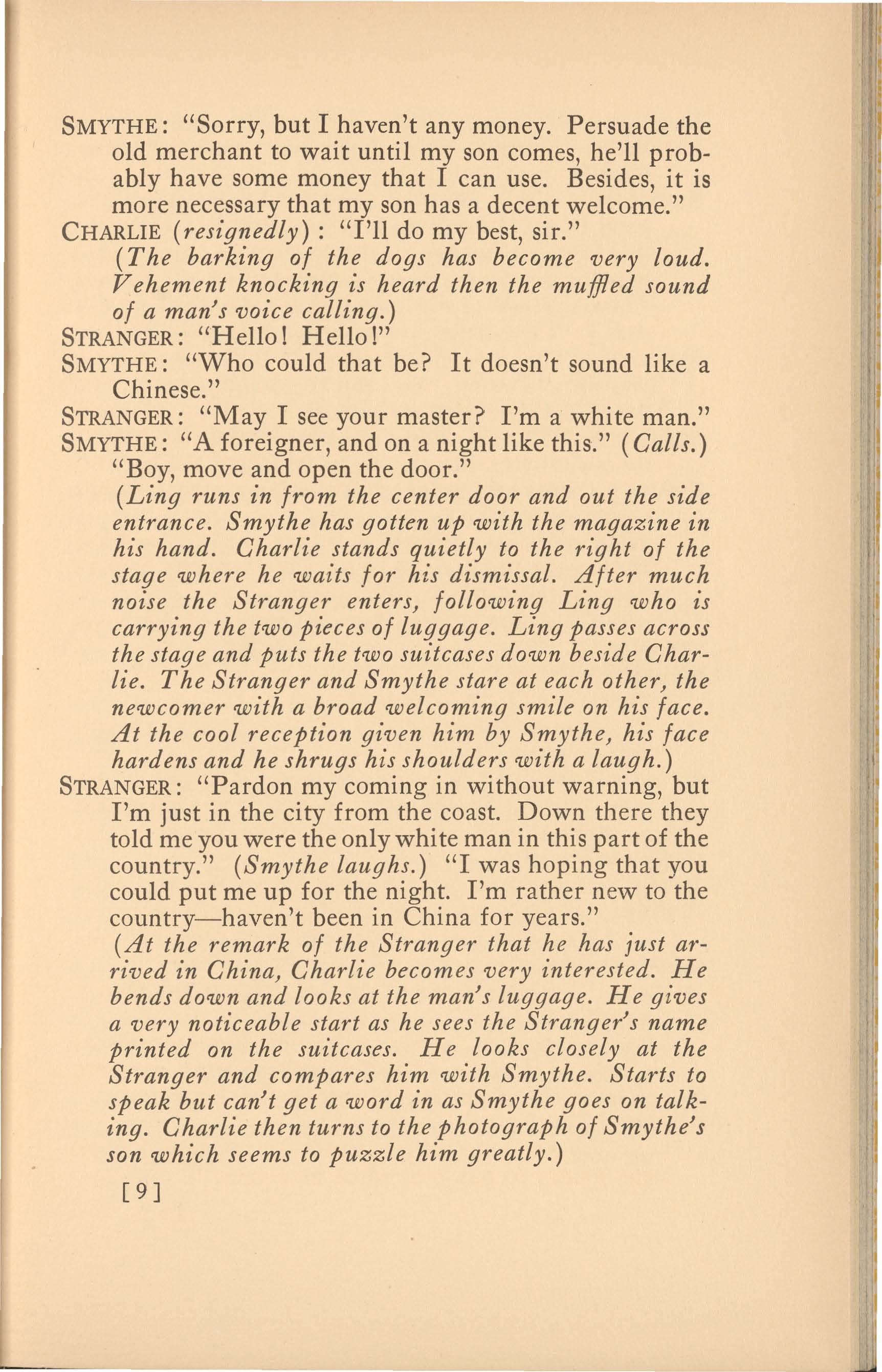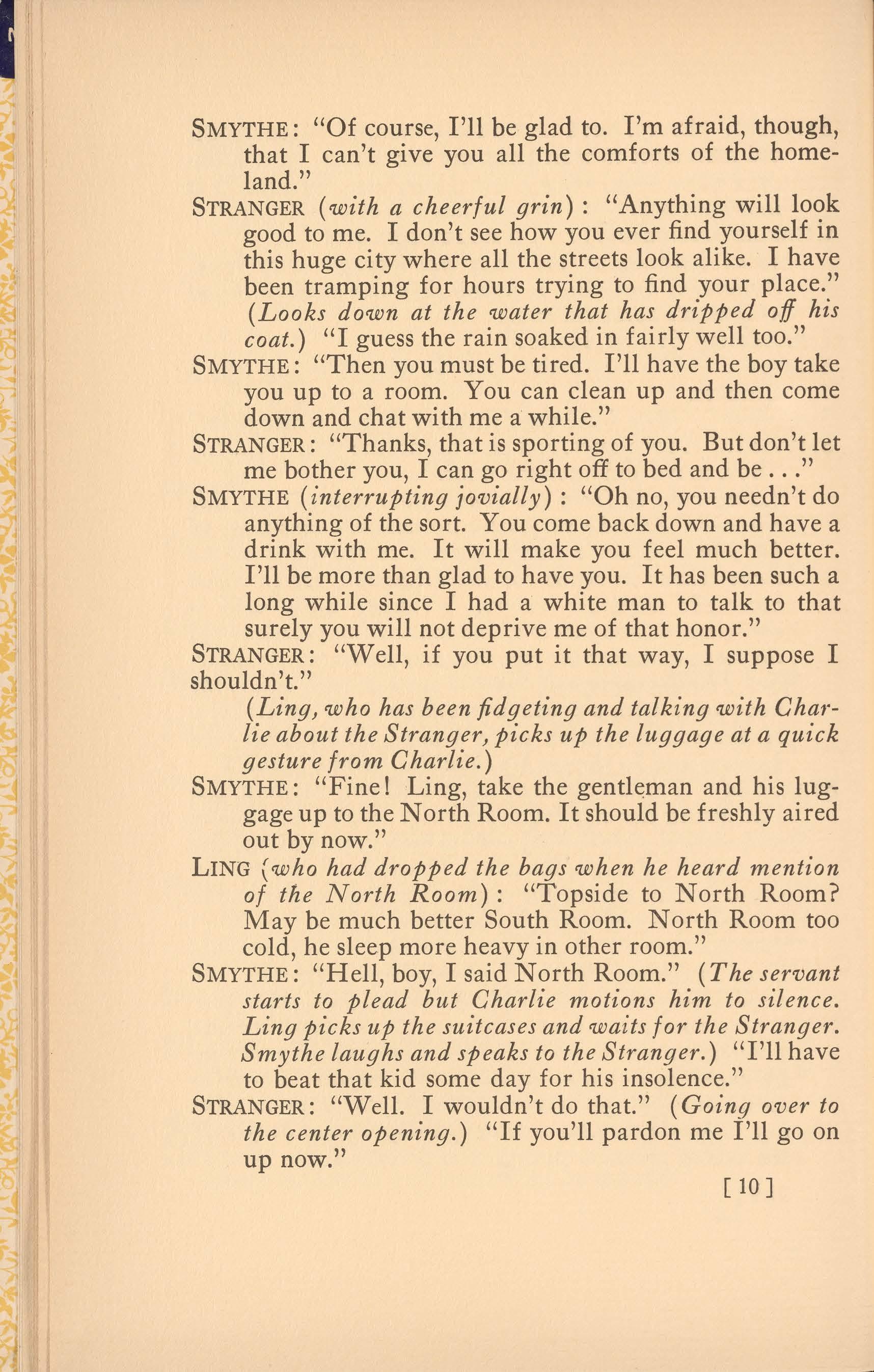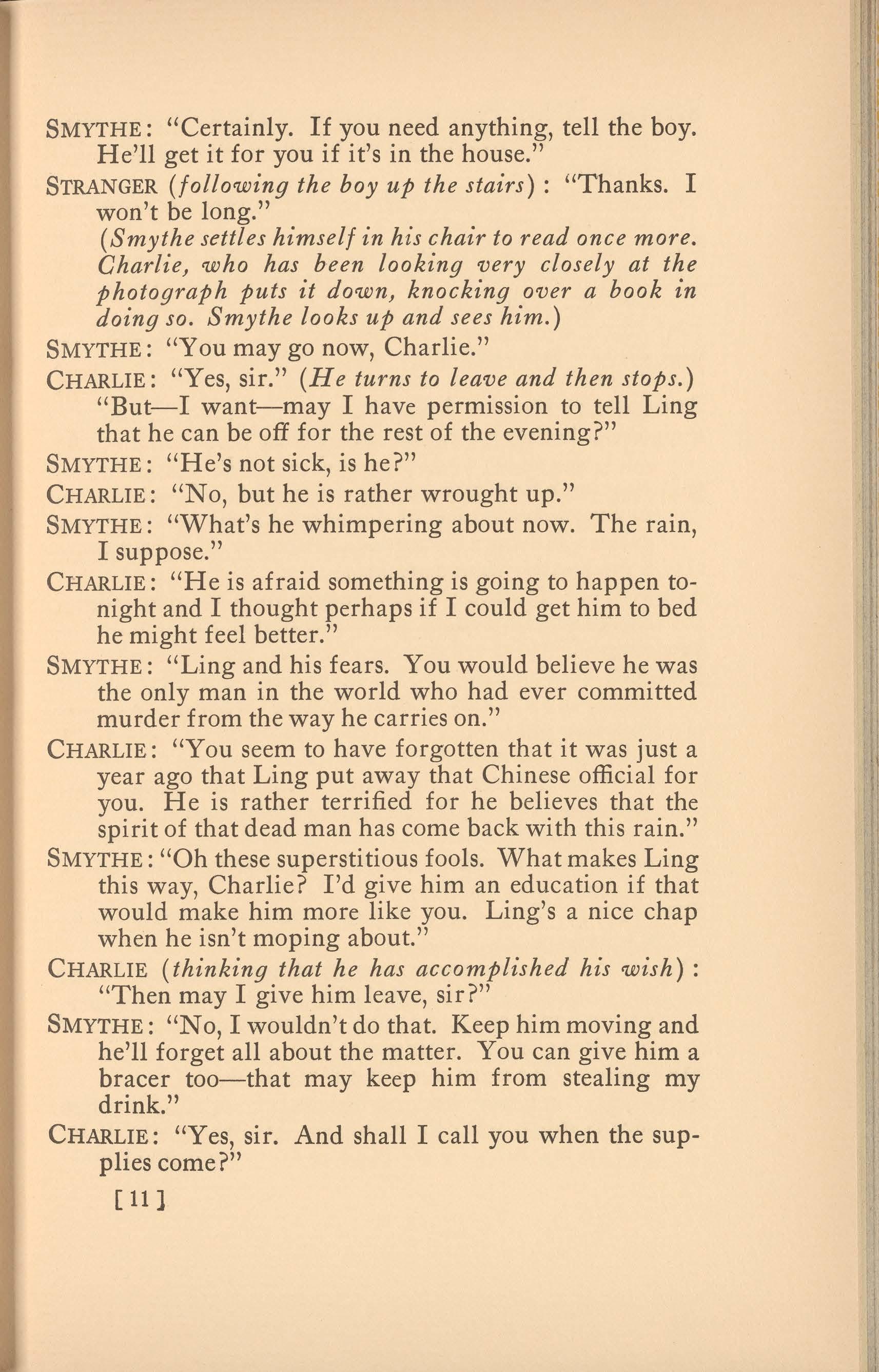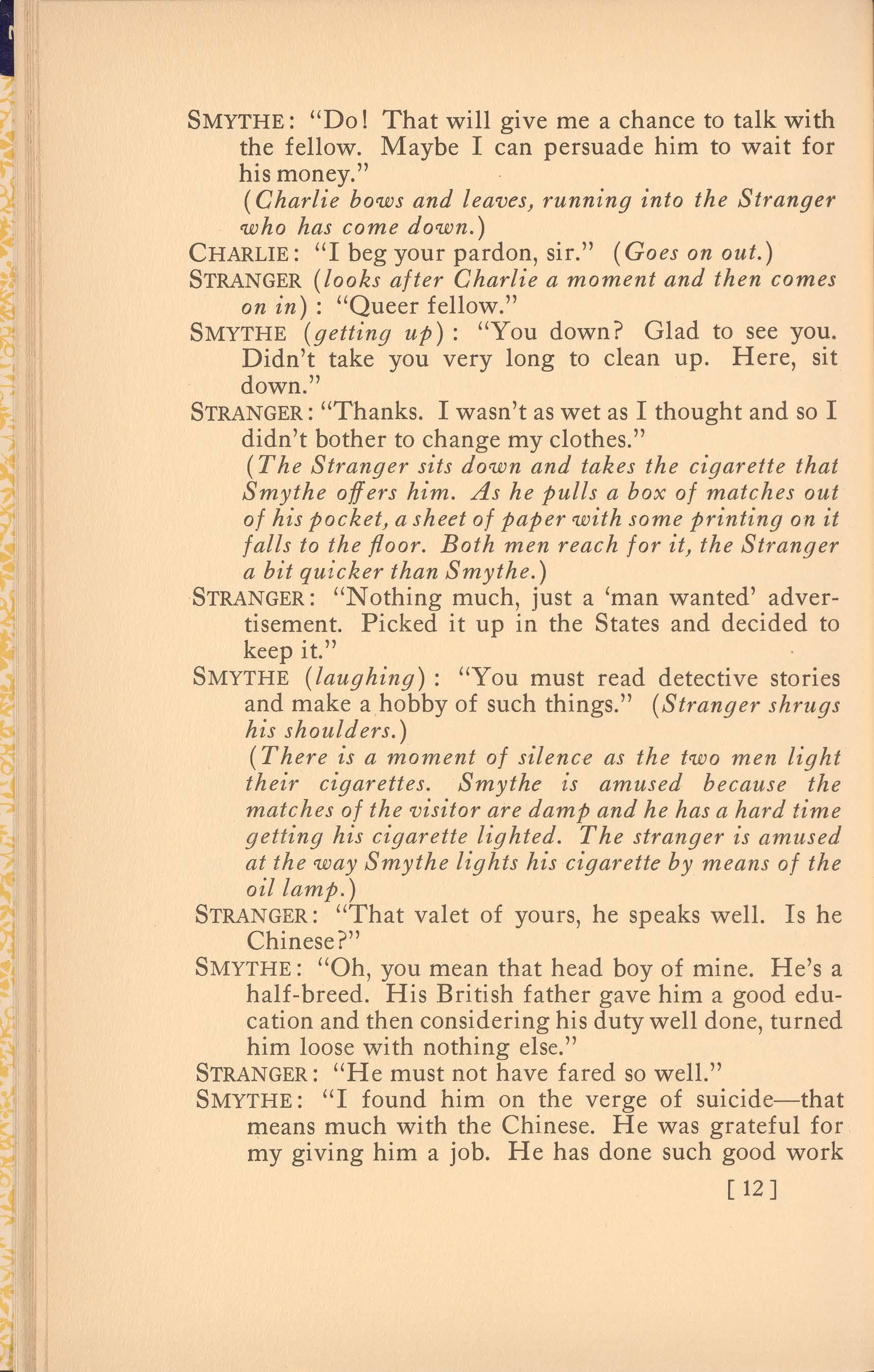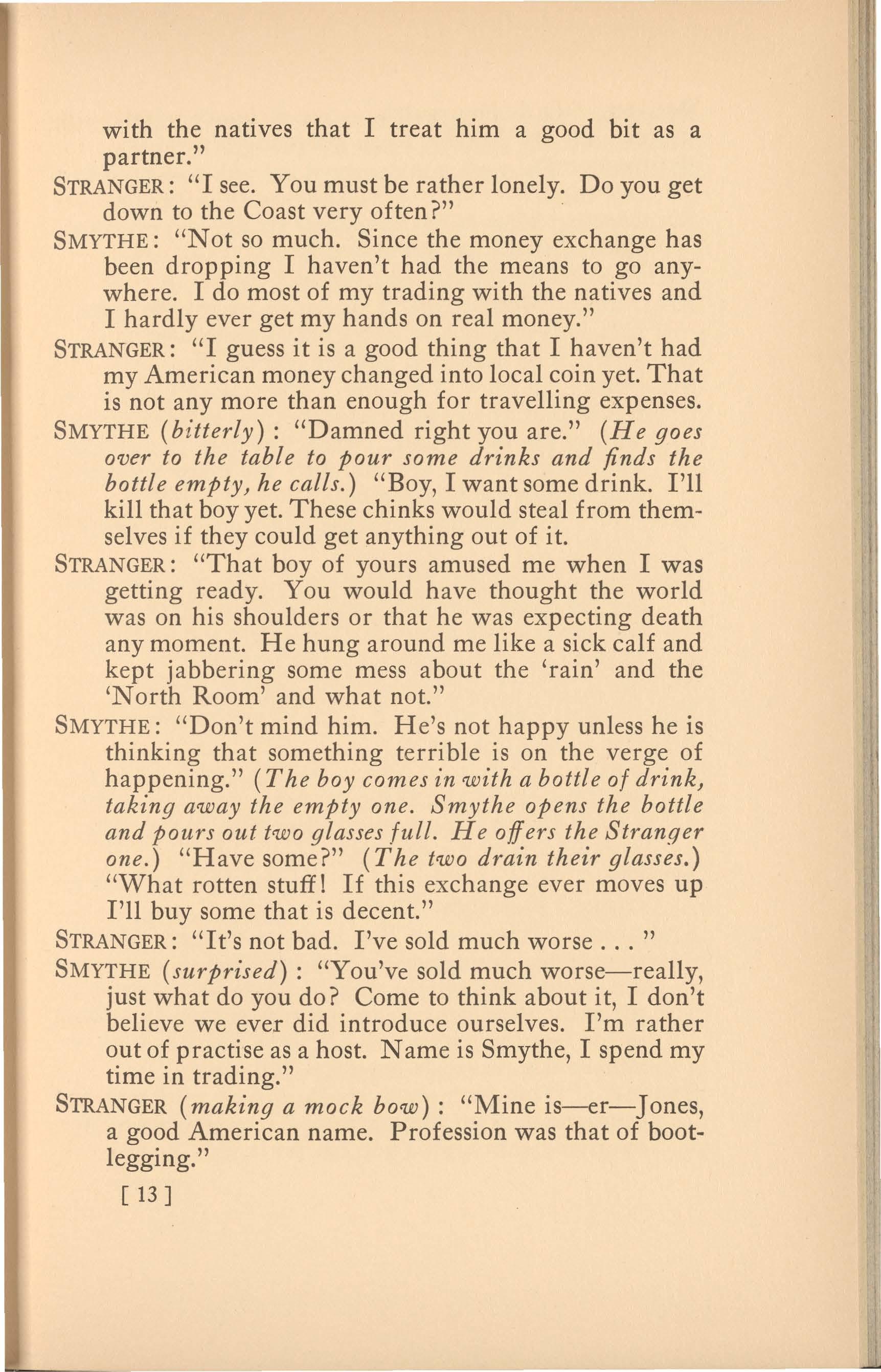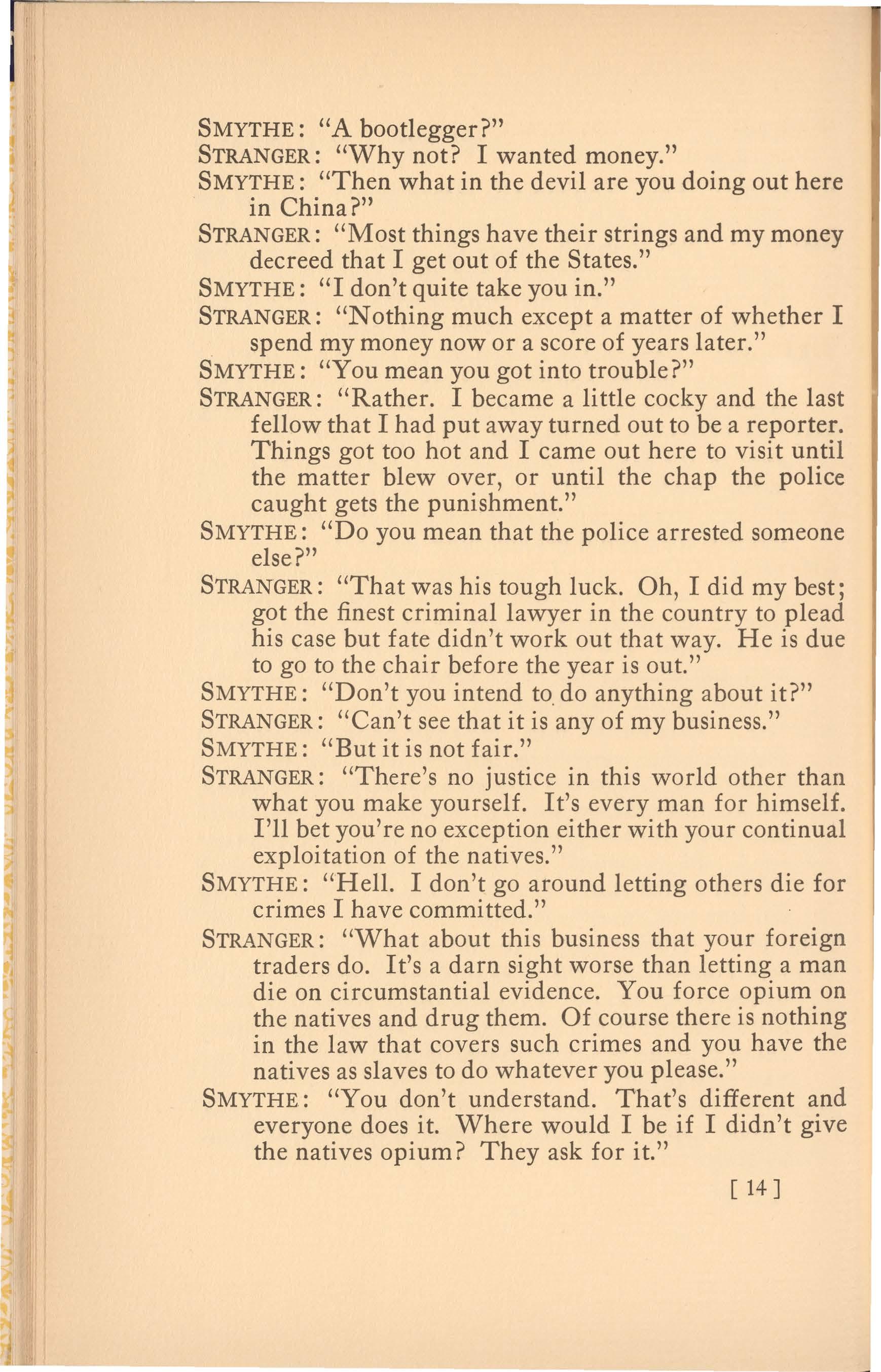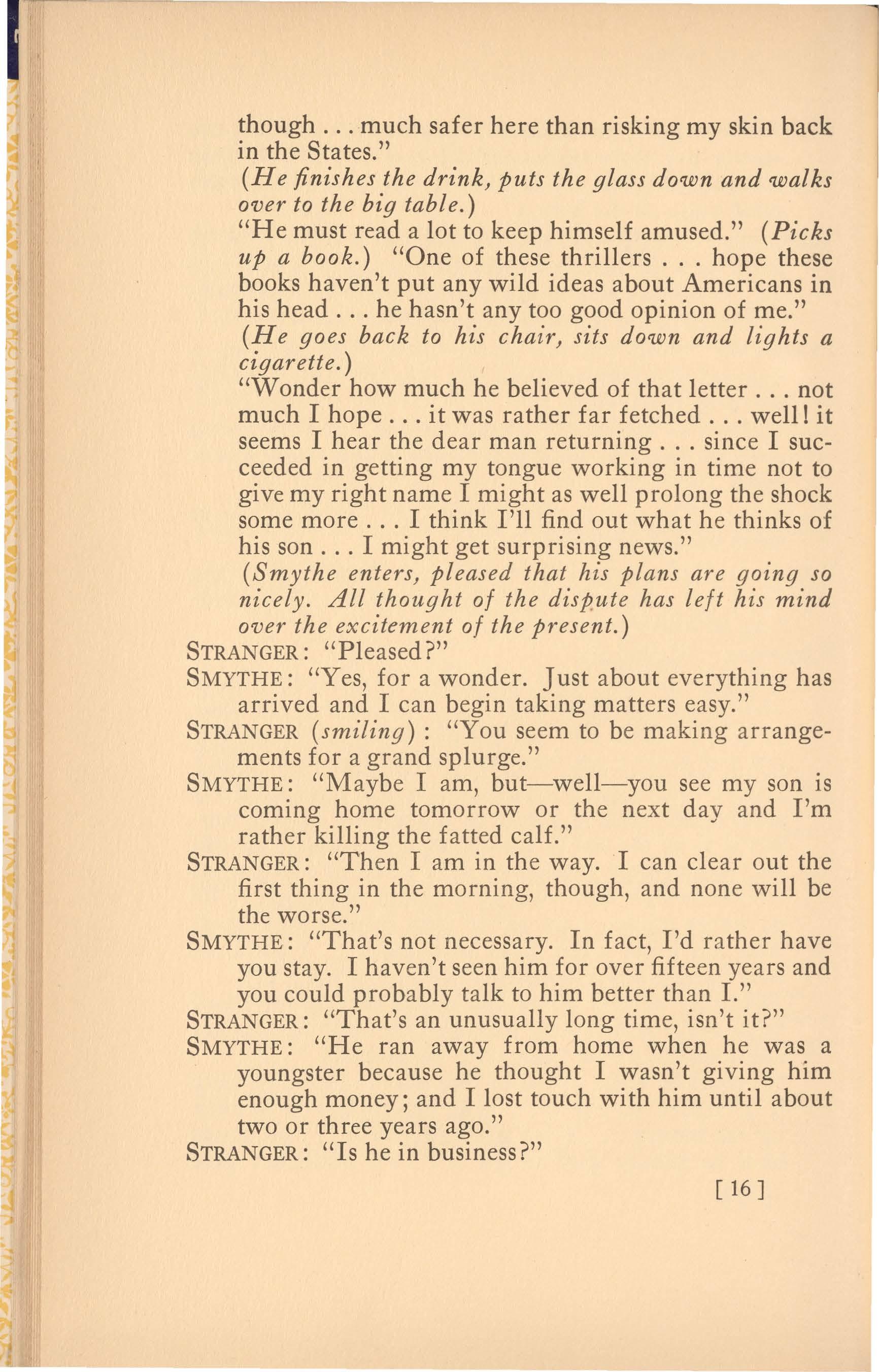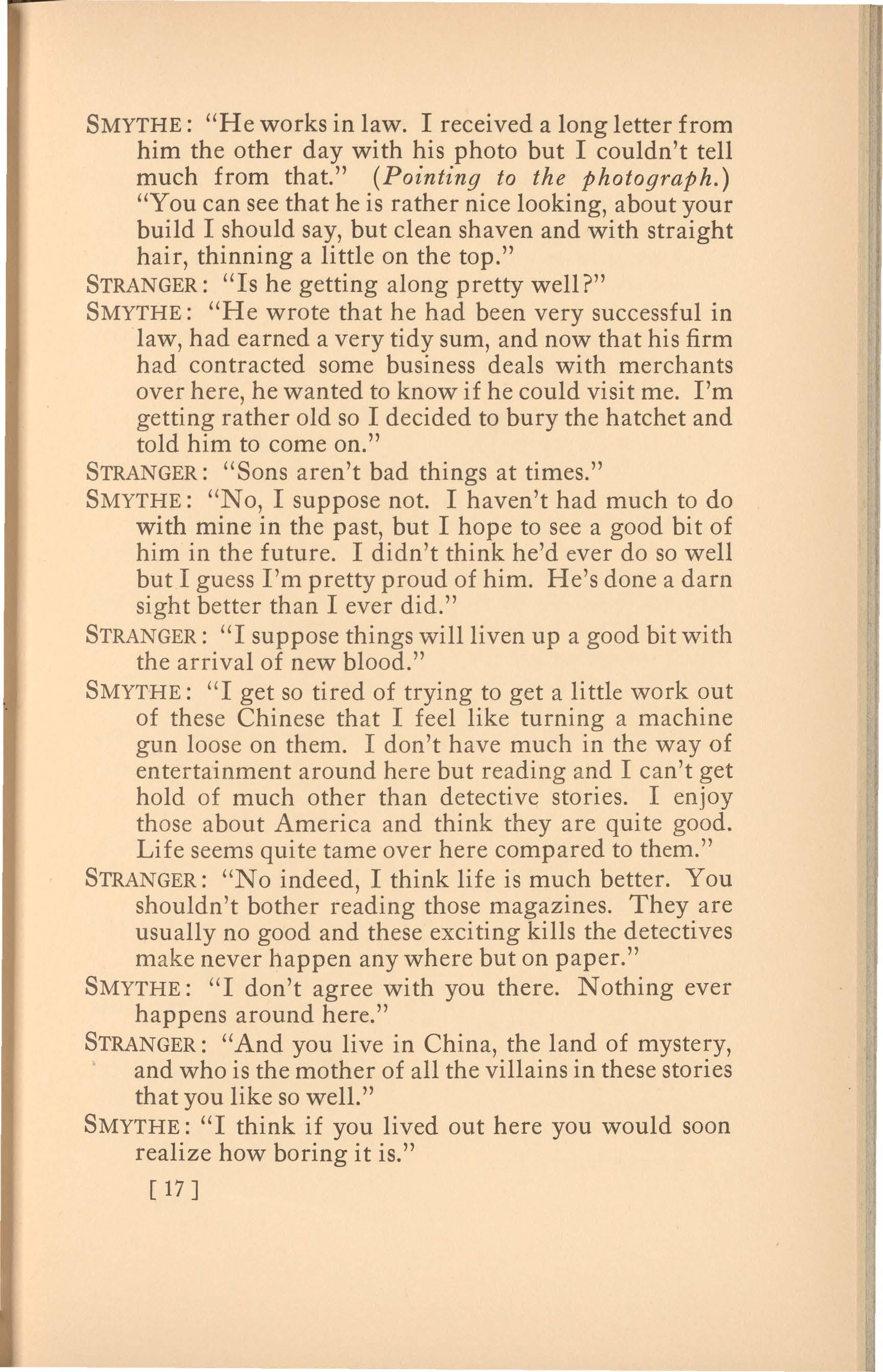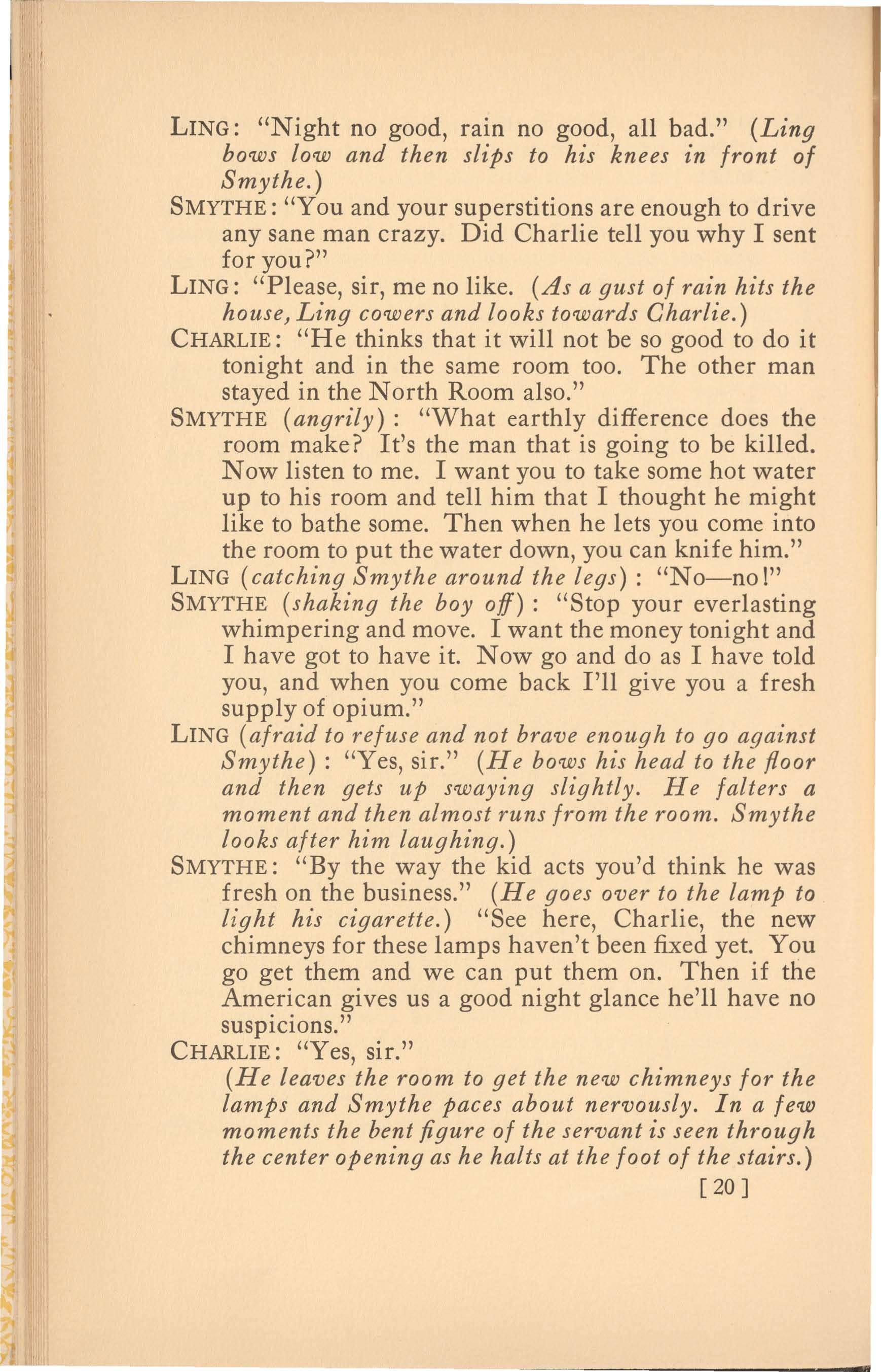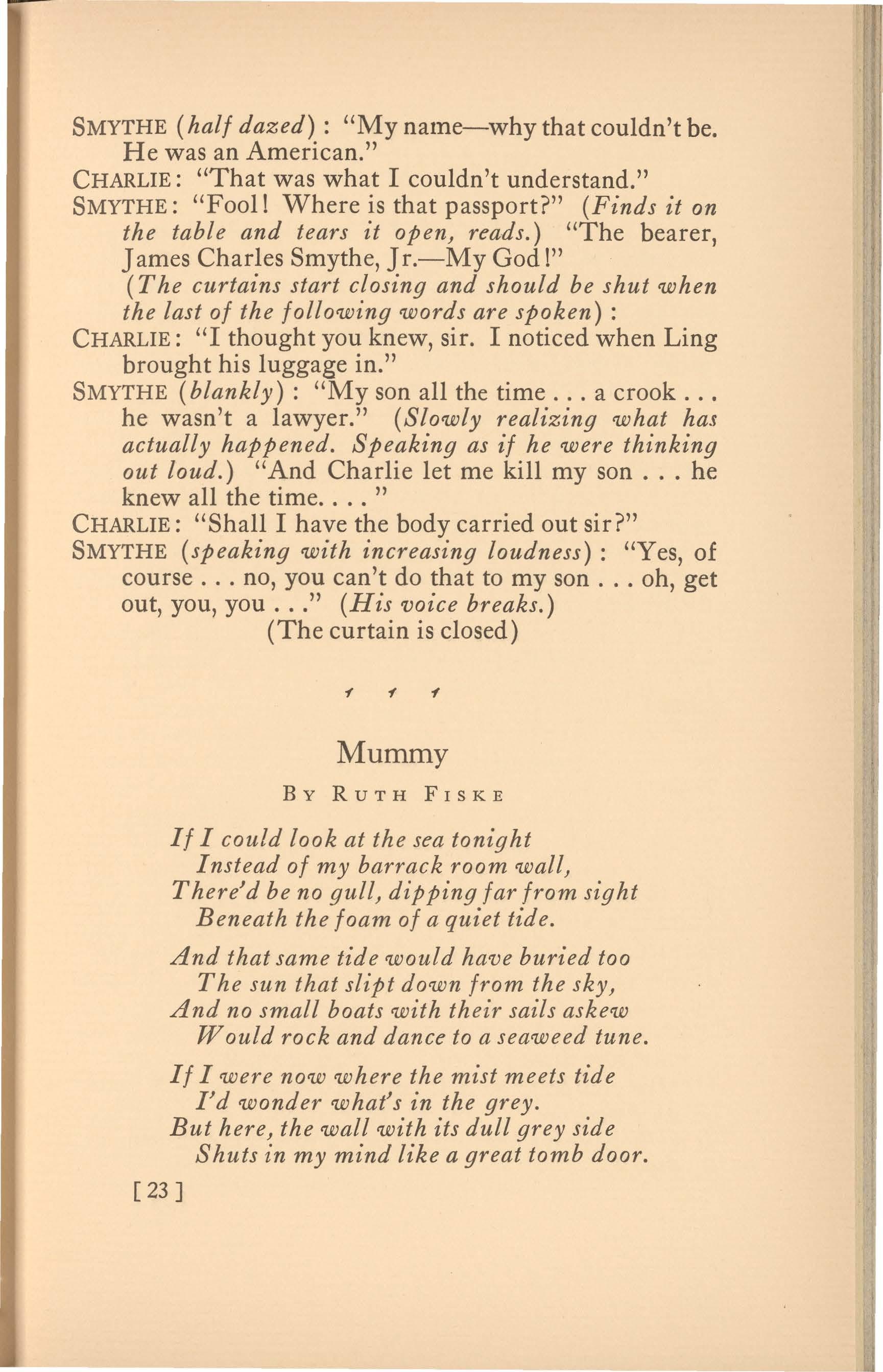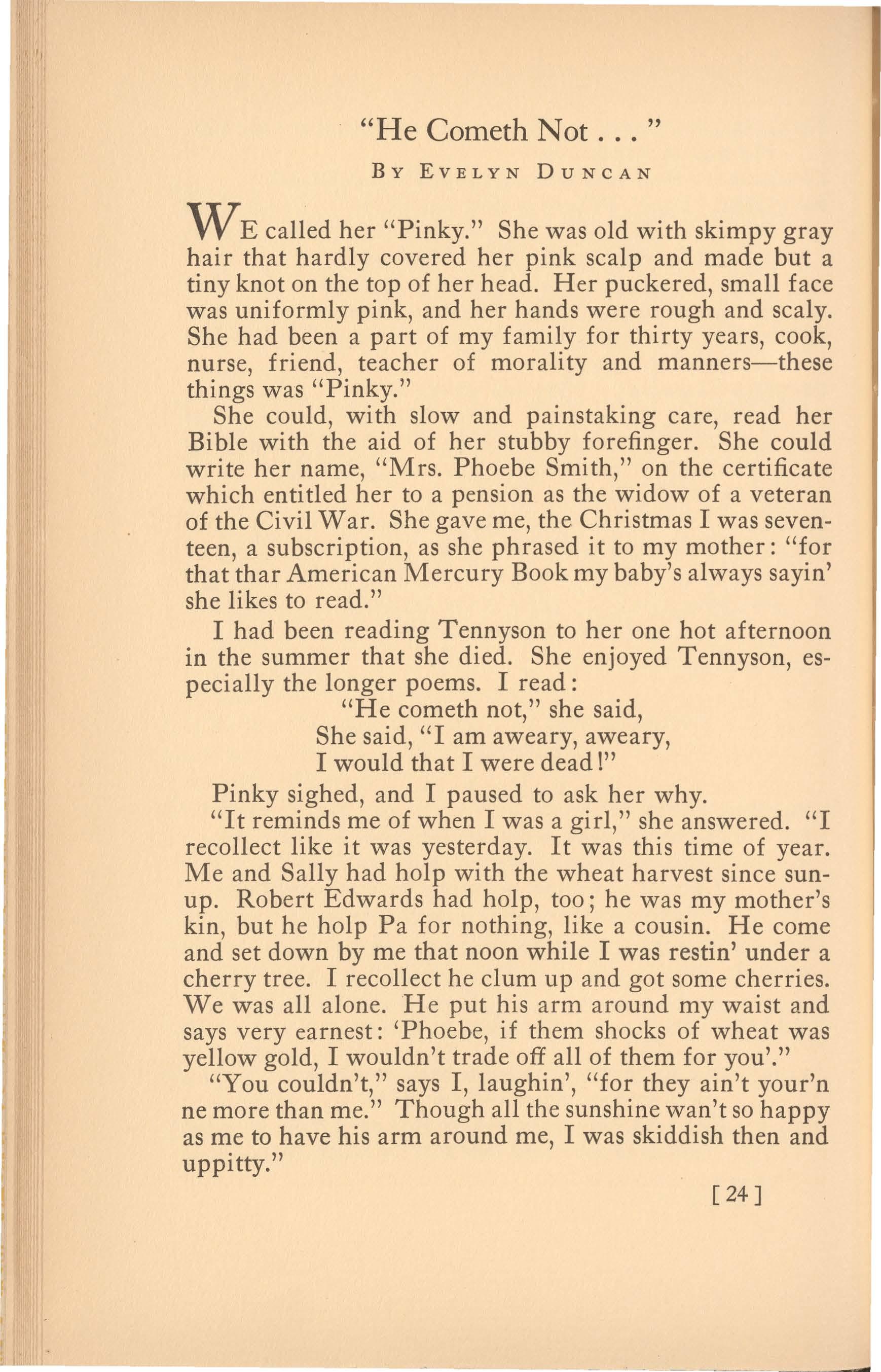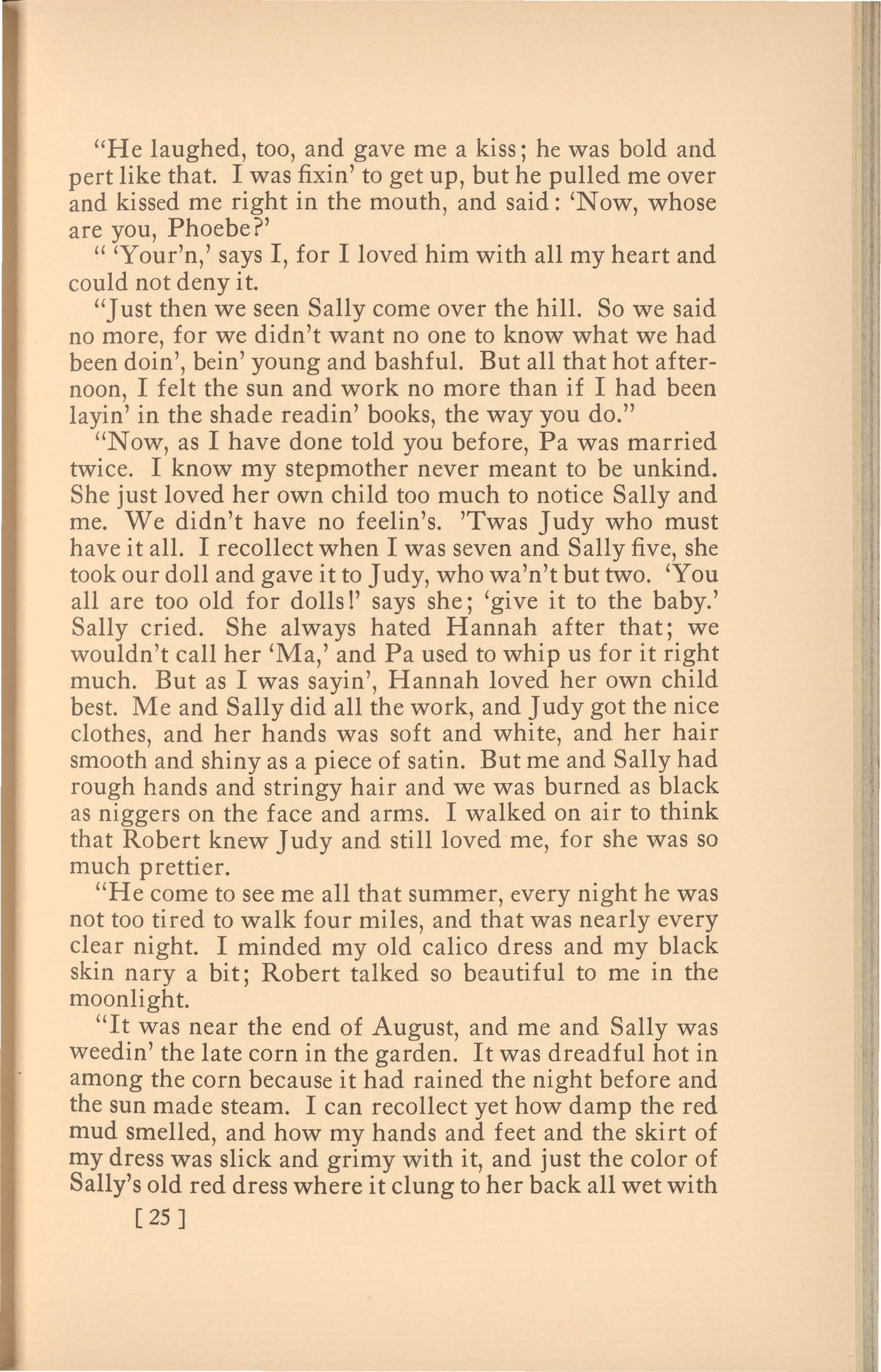T H E MESSENGER
The Son's Father
A PLAY IN ONE ACT
By MARY LUCILE SAUNDERS
Place: In a Chinese town in the far interior.
Time: About 8 o'clock in the evening.
Setting: It is a large room lighted up by the use of many oil lamps, quite old and shabby, and whose glass chimneys are greatly cracked from use. The walls are plain, covered only by rough whitewash that has been freshly scrubbed.
There is an outside door to the left with a small mat for rubbing the feet in front of it. In the center backstage there is an opening through which can be seen the stairs leading up to the second floor of the house.
On the right of the stage is a large, greatly carved hardwood table on which can be seen two lamps, magazines, books , and the large photograph of a young man, Smythe's son. Slightly to the left of the center opening is a small blackwood table with a bottle and some glasses on it.
Two long bamboo chairs with dingy cushions can be seen, one in front of the large table and slightly to the right; the other to the left of the large table.
Outside it is raining, has been raining for weeks, and probably will continue raining for days as it is the rainy season of the year. There is a good wind rising and the dogs can be heard as they prowl about.
Characters:
SMYTHE-A tall spare man of some sixty years. He has spent over forty years in China and as a result moves with the quickness and softness of the natives.
CHARLIE~A half-breed whose foreign blood so predominates that he would appear to be a white man were it not for his wearing the costume of his country. He is Smythe's head boy and thus is in charge of the servants.
LrnG--A young coolie who is a servant in the household. He is a frail, rather weak looking chap.
[ 5]
ISTRANGER-While not quite as tall as Smythe, he gives the impression of being almost a younger edition of the older man. He is flashily dressed, a worldly looking man of about thirty with a short beard, is wearing two or three very expensive rings and has a brilliant jewel as a watch guard • .,
As the curtain rises the room is empty save for the dapper figure of Ling who moves about fixing the cushions on the chairs and arranging the magazines scattered about on the table, months old copies of the Blue Book , Detective Story ~1agazine and A mazing Stories. He is rather jerky in his movements as though motivated by fear. The outside door blows ajar, letting in some wind and rain. Ling hurriedly closes the door, being very careful not to get wet.
LING: ( muttering softly to himself as he comes back into the room and moves towards the small blackwood table.) Better me no get wet (he looks around and sees the rain ,water on the fioor.) Rain, he no good. (Shudders and then goes on with his work. In his cleaning he picks up the bottle on the table, observing that it is not more than about one-third full. His fingers are trembling so as he pours the drink out into a glass that he almost drops it. As he hesitates he hears a sudden gust of rain beating against the house. At this he starts violently and glances quickly about the room, failing to notice the figure of Smythe who has just come down the stairs and is standing on the lower landing.) Damn rain. (Drains the glass as Sm'Ythe comes into the room.)
SMYTHE: ( knocking the glass from the boy's hand.) "What the devil, boy I Do I pay you to drink my stuff?"
LING: ( cowering and looking at the broken glass.) "Me think bottle pretty much empty, too little for you, and ... "
SMYTHE: "Yes, but enough for you to get away with 'me think.' You can cut that quick, I'm doing all the thinking around here. I never saw a chink who had brains yet, except Charlie and he's different. Why [ 6 J
you can't even talk decent English." (He turns to go to the large table and steps on some glass.) "H .ere, clean up this mess before I make you eat it. And don't let there be any next time, I don't want your lousy fingers on my stuff again or I'll-you know damn well what I'll do. ·All you do is pretend you're scared stiff to save your yellow skin; but you just keep on stealing and your pretending won't do you any good."
LING: "Yes, sir." (He backs out. Smythe sits down beside the big table and picks up a Detective Story Magazine and turns the pages hurriedly at first. Ling returns almost immediately with a pan and brush to clean up.)
SMYTHE ( watching the boy with a slight smile on his face, noticing his servant's extreme nervousness) : "Ling."
LING ( without looking up) : "Yes, sir."
SMYTHE: "Tired after cleaning all day?"
LING (after a pause): "No, sir."
SMYTHE (casually, but watching the servant's face carefully) : "I noticed when I came down that all the windows in the North Room were barred. I gave orders to have all the rooms clean and well aired. Why didn't you open those windows?"
LING (speaking in jerks): "It rains all the time-no think -you like house-all wet."
SMYTHE: "I suppose the rain won't enter any of the windows but those in the North Room. No, that's not it. It's just that you are a little yellower than your kind." (His voice becomes hard.) "Now clear out, and if I don't find that North Room freshly aired when I come up, I'll cut short your opium and pay."
LING (willing to do anything to get his opium): "Y-yes, sir." (Bows low and turns away, almost falling over himself as he hurries out.)
SMYTHE: "Poor fool." (Laughs bitterly.) "As if I could pay him should I want to." (He finds a story to his liking and tries to read. Outside the wind blows loudly and the dogs can be heard barking. Smythe [ 7 ]
shifts his position two or three times and then slams the magazine down.) "Hell, who could read with that wind about and those chows yelping-more like committing murder than reading about it." (Smythe digs down into his pocket and pulls out a worn cigarette case. He takes the glass chimney off the nearest oil lamp, bends over and lights the cigarette by the flame. He looks at the chimney in his hand.) "Rather filthy I should say." (He looks at the other oil lamps.) "See here, Chrrrlie hasn't put on the new chimneys. This won't do, the merchant promised to get them here in plenty of time. Where's that head boy of mine, he ought to know. (Calls.) "Charlie, Charlie."
CHARLIE ( entering from the center and bowing slightly) : "You want me?"
SMYTHE ( holding out the lamp chimney) : "Look I I shouldn't say this is clean. The new ones, why haven't they been put in?"
CHARLIE: "They haven't all been taken out of the boxes yet."
SMYTHE ( in disgust) : "What makes you so slow. I suppose the food hasn't come either." ·
CHARLIE (shrugs his shoulder): "No, sir, but I expect it at any rate now."
SMYTHE: "I should hope so. I want all these things finished before tomorrow for certain. Then when that son of mine arrives he'll feel damn proud of his father."
CHARLIE (giving a slight nod of assent) : "Yes, sir. I ordered everything as you wished and the man promised to send up the best he had. It amounted to some twenty Mex."
SMYTHE: "Twenty Mex? That is a little more than I counted on."
CHARLIE: "I had a hard time getting the supplies as cheaply as that, sir. The fellow was angry because you hadn't paid him for the last lot that he sent up."
SMYTHE: "Oh, I see."
CHARLIE( with a good bit of caution) : "Could I have some money to pay him when he comes?"
[ 8]
SMYTHE: "Sorry, but I haven't any money. Persuade the old merchant to wait until my son comes, he'll probably have some money that I can use. Besides, it is more necessary that my son has a decent welcome."
CHARLIE(resignedly) : "I'll do my best, sir."
(The barking of the dogs has become very loud. Vehement knocking is heard then the muffled sound of a man's voice calling.)
STRANGER:"Hello I Hello I"
SMYTHE: "Who could that be? It doesn't sound like a Chinese."
STRANGER:"May I see your master? I'm a white man."
SMYTHE: "A foreigner, and on a night like this." (Calls.) "Boy, move and open the door."
(Ling runs in from the center door and out the side entrance. Smythe has gotten up with the magazine in his hand. Charlie stands quietly to the right of the stage where he waits for his dismissal. After much noise the Stranger enters, following Ling who is carrying the two pieces of luggage. Ling passes across the stage and puts the two suitcases down beside Charlie. The Stranger and Smythe stare at each other, the newcomer with a broad welcoming smile on his face. At the cool reception given him by Smythe, his face hardens and he shrugs his shoulders with a laugh.)
STRANGER:"Pardon my coming in without warning, but I'm just in the city from the coast. Down there they told me you were the only white man in this part of the country." (Smythe laughs.) "I was hoping that you could put me up for the night. I'm rather new to the country-haven't been in China for years."
(At the remark of the Stranger that he has just arrived in China, Charlie becomes very interested. He bends down and looks at the man's luggage. He gives a very noticeable start as he sees the Stranger's name printed on the suitcases. He looks closely at the Stranger and compares him with Smythe. Starts to speak but can't get a word in as Smythe goes on talking. Charlie then turns to the photograph of Smythe's son which seems to puzzle him greatly.)
[9]
SMYTHE: "Of course, I'll be glad to. I'm afraid, though, that I can't give you all the comforts of the homeland."
STRANGER ( with a cheerful grin) : "Anything will look good to me. I don't see how you ever find yourself in this huge city where all the streets look alike. I have been tramping for hours trying to find your place." (Looks down at the water that has dripped off his coat.) "I guess the rain soaked in fairly well too."
SMYTHE: "Then you must be tired. I'll have the boy take you up to a room. You can clean up and then come down and chat with me a while."
STRANGER:"Thanks, that is sporting of you. But don't let me bother you, I can go right off to bed and be ... "
SMYTHE ( interrupting jovially) : "Oh no, you needn't do anything of the sort. You come back down and have a drink with me. It will make you feel much better. I'll be more than glad to have you. It has been such a long while since I had a white man to talk to that surely you will not deprive me of that honor."
STRANGER:"Well, if you put it that way, I suppose I shouldn't."
(Ling, who has been fidgeting and talking with Charlie about the Stranger, picks up the luggage at a quick gesture from Charlie.)
SMYTHE: "Fine 1 Ling, take the gentl<:;man and his luggage up to the North Room. It should be freshly aired out by now."
LING ( who had dropped the bags when he heard mention of the North Room) : "Topside to North Room? May be much better South Room. North Room too cold, he sleep more heavy in other room."
SMYTHE: "Hell, boy, I said North Room." (The servant starts to plead but Charlie motions him to silence. Ling picks up the suitcases and waits for the Stranger. Smythe laughs and speaks to the Stranger.) "I'll have to beat that kid some day for his insolence."
STRANGER:"Well. I wouldn't do that." ( Going over to the center opening.) "If you'll pardon me I'll go on up now."
[ 10 J
SMYTHE: "Certainly. If you need anything, tell the boy. He'll get it for you if it's in the house."
STRANGER(following the boy up the stairs) : "Thanks. I won't be long."
(Smythe settles himself in his chair to read once more. Charlie 1 who has been looking very closely at the photograph puts it down 1 knocking over a book in doing so. Smythe looks up and sees him.)
SMYTHE: "You may go now, Charlie."
CHARLIE: "Yes, sir." (He turns to leave and then stops.)
"But-I want-may I have permission to tell Ling that he can be off for the rest of the evening?"
SMYTHE: "He's not sick, is he?"
CHARLIE: "No, but he is rather wrought up."
SMYTHE: "What's he whimpering about now. The rain, I suppose."
CHARLIE: "He is afraid something is going to happen tonight and I thought perhaps if I could get him to bed he might feel better."
SMYTHE: "Ling and his fears. You would believe he was the only man in the world who had ever committed murder from the way he carries on."
CHARLIE: "You seem to have forgotten that it was just a year ago that Ling put away that Chinese official for you. He is rather terrified for he believes that the spirit of that dead man has come back with this rain."
SMYTHE:"Oh these superstitious fools. What makes Ling this way, Charlie? I'd give him an education if that would make him more like you. Ling's a nice chap when he isn't moping about."
CHARLIE ( thinking that he has accomplished his wish) : "Then may I give him leave, sir?"
SMYTHE: "No, I wouldn't do that. Keep him moving and he'll forget all about the matter. You can give him a bracer too-that may keep him from stealing my drink."
CHARLIE: "Yes, sir. And shall I call you when the supplies come?"
[11]
SMYTHE: "Do! That will give me a chance to talk with the fellow. Maybe I can persuade him to wait for his money."
( Charlie bows and leaves, running into the Stranger who has come down.)
CHARLIE: "I beg your pardon, sir." ( Goes on out.)
STRANGER ( looks after Charlie a moment and then comes on in) : "Queer fellow."
SMYTHE (getting up) : "You down? Glad to see you. Didn't take you very long to clean up. Here, sit down."
STRANGER:"Thanks. I wasn't as wet as I thought and so I didn't bother to change my clothes."
(The Stranger sits down and takes the cigarette that Smythe offers him. As he pulls a box of matches out of his pocket, a sheet of paper with some printing on it falls to the fioor. Both men reach for it, the Stranger a bit quicker than Smythe.)
STRANGER:"Nothing much, just a 'man wanted' advertisement. Picked it up in the States and decided to keep it."
SMYTHE (laughing) : "You must read detective stories and make a hobby of such things." (Stranger shrugs his shoulders.)
(There is a moment of silence as the two men light their cigarettes. Smythe is amused because the matches of the visitor are damp and he has a hard time getting his cigarette lighted. The stranger is amused at the way Smythe lights his cigarette by means of the oil lamp.)
STRANGER:"That valet of yours, he speaks well. Is he Chinese?"
SMYTHE: "Oh, you mean that head boy of mine. He's a half-breed. His British father gave him a good education and then considering his duty well done, turned him loose with nothing else."
STRANGER:"He must not have fared so well."
SMYTHE: "I found him on the verge of suicide-that means much with the Chinese. He was grateful for my giving him a job. He has done such good work [ 12 J
with the natives that I treat him a good bit as a partner."
STRANGER:"I see. You must be rather lonely. Do you get down to the Coast very often?"
SMYTHE: "Not so much. Since the money exchange has been dropping I haven't had the means to go anywhere. I do most of my trading with the natives and I hardly ever get my hands on real money."
STRANGER:"I guess it is a good thing that I haven't had my American money changed into local coin yet. That is not any more than enough for travelling expenses.
SMYTHE (b i tterly) : "Damned right you are." (He goes over to the table to pour some drinks and finds the bottle empty, he calls.) "Boy, I want some drink. I'll kill that boy yet. These chinks would steal from themselves if they could get anything out of it.
STRANGER:"That boy of yours amused me when I was getting ready. You would have thought the world was on his shoulders or that he was expecting death any moment. He hung around me like a sick calf and kept jabbering some mess about the 'rain' and the ' North Room' and what not."
SMYTHE: "Don't mind him. He's not happy unless he is thinking that something terrible is on the verge of happening." (The boy comes in with a bottle of drink, taking away the empty one. Smythe opens the bottle and pours out two glasses full. He offers the Stranger one.) "Have some?" (The two drain their glasses.) "What rotten stuff I If this exchange ever moves up I'll buy some that is decent."
STRANGER:"It's not bad. I've sold much worse ... "
SMYTHE ( surprised) : "You've sold much worse-really, just what do you do? Come to think about it, I don't believe we ever did introduce ourselves. I'm rather out of practise as a host. Name is Smythe, I spend my time in trading."
STRANGER ( making a mock bow) : "Mine is-er-Jones, a good American name. Profession was that of bootlegging."
[ 13 ]
SMYTHE: "A bootlegger?"
STRANGER:"Why not? I wanted money."
SMYTHE: "Then what in the devil are you doing out here in China?"
STRANGER:"Most things have their strings and my money decreed that I get out of the States."
SMYTHE: "I don't quite take you in."
STRANGER:"Nothing much except a matter of whether I spend my money now or a score of years later."
SMYTHE: "You mean you got into trouble?"
STRANGER:"Rather. I became a little cocky and the last fellow that I had put away turned out to be a reporter. Things got too hot and I came out here to visit until the matter blew over, or until the chap the police caught gets the punishment."
SMYTHE: "Do you mean that the police arrested someone else?"
STRANGER:"That was his tough luck. Oh, I did my best; got the finest criminal lawyer in the country to plead his case but fate didn't work out that way. He is due to go to the chair before the year is out."
SMYTHE: "Don't you intend to. do anything about it?"
STRANGER:"Can't see that it is any of my business."
SMYTHE: "But it is not fair."
STRANGER:"There's no justice in this world other than what you make yourself. It's every man for himself. I'll bet you're no exception either with your continual exploitation of the natives."
SMYTHE: "Hell. I don't go around letting others die for crimes I have committed."
STRANGER:"What about this business that your foreign traders do. It's a darn sight worse than letting a man die on circumstantial evidence. You force opium on the natives and drug them. Of course there is nothing in the law that covers such crimes and you have the natives as slaves to do whatever you please."
SMYTHE: "You don't understand. That's different and everyone does it. Where would I be if I didn't give the natives opium? They ask for it."
[ 14]
STRANGER:"Sure, just because everyone does it makes the matter perfectly right and the fact that the Chinese Law and officials are just as corrupt as you makes the conditions all the better."
SMYTHE: "But they are natives and I'm a white man. I can't have the yellow skunks getting along as well as I do. It doesn't pay to treat them white because they aren't. Dope is the only language they know."
STRANGER:"And you call that justice. I think I am a damned sight whiter than you are. At least I do my work on the level."
(There is heard the sound of the supplies being brought in. The head boy comes to the center opening.)
CHARLIE: "The supplies have come, sir. You may inspect them now if you wish."
SMYTHE: "Of course, I'll be right out. You'll excuse me for a few minutes. I can't have these merchants putting anything over on me."
STRANGER:"Certainly."
(Smythe and the head boy leave. The Stranger looks after them a moment and then gets up out of his chair to look around. He sees the photograph of Smythe's son and picks it up, laughing softly as he looks at it.)
STRANGER:"So he got this picture after all. I guess Shorty would feel kind of funny to know that he was supposed to be the son of the old man. By golly, the old fool didn't even recognize me ... don't suppose he would though with this photograph to go by ... he probably thinks of me as the same impertinent rascal who ran away from home at fifteen ... I can't see why parents never think their kids grow up .... "
(Puts the picture down and walks over to the small table and pours himself a drink. He looks around the room noticing how poorly it is furnished.)
"It must be right awful to live here ... doesn't have it furnished very well ... didn't know he was so hard up for money ... I can give him some ... no doubt he'll be plenty glad to get it ... I shouldn't care
[ 15]
though ... much safer here than risking my skin back in the States."
(He finishes the drink, puts the glass down and walks over to the big table.)
"He must read a lot to keep himself amused." (Picks up a book.) "One of these thrillers ... hope these books haven't put any wild ideas about Americans in his head ... he hasn't any too good opinion of me." (He goes back to his chair, sits down and lights a cigarette.)
"Wonder how much he believed of that letter ... not much I hope ... it was rather far fetched ... well! it seems I hear the dear man returning ... since I succeeded in getting my tongue working in time not to give my right name I might as well prolong the shock some more ... I think I'll find out what he thinks of his son ... I might get surprising news."
(Smythe enters, pleased that his plans are going so nicely. All thought of the dispute has left his mind over the excitement of the present.)
STRANGER:"Pleased?"
SMYTHE: "Yes, for a wonder. Just about everything has arrived and I can begin taking matters easy."
STRANGER(smiling) : "You seem to be making arrangements for a grand splurge."
SMYTHE: "Maybe I am, but-well-you see my son is coming home tomorrow or the next day and I'm rather killing the fatted calf."
STRANGER:"Then I am in the way. I can clear out the first thing in the morning, though, and none will be the worse."
SMYTHE: "That's not necessary. In fact, I'd rather have you stay. I haven't seen him for over fifteen years and you could probably talk to him better than I."
STRANGER:"That's an unusually long time, isn't it?"
SMYTHE: "He ran away from home when he was a youngster because he thought I wasn't giving him enough money; and I lost touch with him until about two or three years ago."
STRANGER:"Is he in business?"
[ 16]
SMYTHE: "He works in law. I received a long letter from him the other day with his photo but I couldn't tell much from that." (Pointing to the photograph.) "You can see that he is rather nice looking, about your build I should say, but clean shaven and with straight hair, thinning a little on the top."
STRANGER:"Is he getting along pretty well?"
SMYTHE: "He wrote that he had been very successful in law, had earned a very tidy sum, and now that his firm had contracted some business deals with merchants over here, he wanted to know if he could visit me. I'm getting rather old so I decided to bury the hatchet and told him to come on."
STRANGER:"Sons aren't bad things at times."
SMYTHE: "No, I suppose not. I haven't had much to do with mine in the past, but I hope to see a good bit of him in the future. I didn't think he'd ever do so well but I guess I'm pretty proud of him. He's done a darn sight better than I ever did."
STRANGER:"I suppose things will liven up a good bit with the arrival of new blood."
SMYTHE: "I get so tired of trying to get a little work out of these Chinese that I feel like turning a machine gun loose on them. I don't have much in the way of entertainment around here but reading and I can't get hold of much other than detective stories. I enjoy those about America and think they are quite good. Life seems quite tame over here compared to them."
STRANGER:"No indeed, I think life is much better. You shouldn't bother reading those magazines. They are usually no good and these exciting kills the detectives make never happen any where but on paper."
SMYTHE: "I don't agree with you there. Nothing ever happens around here."
STRANGER:"And you live in China, the land of mystery, and who is the mother of all the villains in these stories that you like so well."
SMYTHE: "I think if you lived out here you would soon realize how boring it is."
[ 17 J
ISTRANGER:"Where is your imagination; look at us, listen to the weather, this is much better than any story. Why the setting is perfect. You are an old white man in a huge Chinese city where there is fabulous wealth; here I am an ex-crook, what more could an author want than to have your son arrive tomorrow, find his father dead, the possessions all gone, and the only clue that there had been a stranger whom no one knew."
SMYTHE: "You may have a good sense of humor, only I haven't any money."
STRANGER: "And I am much too tired to kill you." (Stretches slowly.) "I bet I'll be stiff tomorrow. I feel it in my bones." (Yawns.) "I think I'll go on up. It's been pleasant talking with you but(looks at his watch) it is getting rather late."
SMYTHE: "Of course, don't let me keep you up."
STRANGER(leaving) : "I have enjoyed myself and thanks for everything." (Exit.)
SMYTHE ( calling after the Stranger as he goes up the stairs) : "Better go to sleep and forget that you have an imagination, it's not healthy in China."
STRANGER:"I never let mine bother me. Good night."
SMYTHE: "Good night." ( Comes back to the table.) "Wish I had some of the money that man has. I never saw such beautiful rings before and that watch guard, it must have cost a small fortune."
(The head boy comes in somewhat hurriedly.)
CHARLIE: "The man who brought the supplies is still here. He swears he won't go unless you pay the money now."
SMYTHE: "I can't pay what I haven't got. Why won't he wait?"
CHARLIE: "He says that he has waited too many times already and that if you don't pay he will take away the food."
SMYTHE: "I can't have my son finding me a beggar and I won't. I have got to have some money then. Where'll I get it?"
CHARLIE: "The gentleman, he looks pretty rich. Maybe he can lend it."
[ 18 ]
SMYTHE: "He's no good. Hell, American crooks don't go around lending money."
CHARLIE: "If he is bad, why not take it."
SMYTHE: "I hadn't thought of that. Why not? He got his money crooked, he's a stranger here and if anyone asks questions, we can point to his record and say that he assaulted me."
CHARLIE: "Are you going to kill?"
SMYTHE: "Of course. He knows I haven't got any money and if the money was stolen, he'd get me. Where's Ling? He can do it."
CHARLIE: "But-."
SMYTHE: "But what? Ling did that last job all right and escaped with his skin. This ought to be much easierthe man's tired and he doesn't expect anything. You go get Ling."
CHARLIE: "Yes sir." (Bows slightly and leaves the room.)
SMYTHE (gives a low whistle and walks about the room) : "I've got a damn good head boy I have. I guess that college education didn't hurt after all, pretty penny it cost me though. I was rich then, had about all I wanted, and by gad I am going to be rich again. Then I can give my son things instead of having to beg off him."
"It will do that rum runner good to get his punishment. I have no use for these Americans who are not even white to their own kind. Hell, he had his nerve putting me in the same class with him."
"I bet he's got plenty of money too, he certainly does dress like it. And with that money I'll be as good as that rascal boy of mine."
"It's about time for Charlie to come back with Ling. Why doesn't he hurry?" (Looks up relieved as Charlie returns practically dragging Ling with him. The servant is terrified and almost weeping.)
CHARLIE: "I brought him, sir."
SMYTHE: "Yes, yes, I see you have." ( Turns abruptly to Ling.) "Boy, stop acting like a fool. What are you scared about?"
[ 19 J
LING: "Night no good, rain no good, all bad." (Ling bows low and then slips to his knees in front of Smythe.)
SMYTHE: "You and your superstitions are enough to drive any sane man crazy. Did Charlie tell you why I sent for you?"
LING: "Please, sir, me no like. (As a gust of rain hits the house, Ling cowers and looks towards Charlie.)
CHARLIE: "He thinks that it will not be so good to do it tonight and in the same room too. The other man stayed in the North Room also."
SMYTHE (angrily) : "What earthly difference does the room make? It's the man that is going to be killed. Now listen to me. I want you to take some hot water up to his room and tell him that I thought he might like to bathe some. Then when he lets you come into the room to put the water down, you can knife him."
LING ( catching Smythe around the legs) : "No-no I"
SMYTHE (shaking the boy off): "Stop your everlasting whimpering and move. I want the money tonight and I have got to have it. Now go and do as I have told you, and when you come back I'll give you a fresh supply of opium."
LING (afraid to refuse and not brave enough to go against Smythe) : "Yes, sir." (He bows his head to the fioor and then gets up swaying slightly. He falters a moment and then almost runs from the room. Smythe looks after him laughing.)
SMYTHE: "By the way the kid acts you'd think he was fresh on the business." (He goes over to the lamp to light his cigarette.) "See here, Charlie, the new chimneys for these lamps haven't been fixed yet. You go get them and we can put them on. Then if the American gives us a good night glance he'll have no suspicions."
CHARLIE: "Yes, sir."
(He leaves the room to get the new chimneys for the lamps and Smythe paces about nervously. In a few moments the bent figure of the servant is seen through the center opening as he halts at the foot of the stairs.)
[ 20]
SMYTHE: "Go on, Boy, nothing is going to happen to you. I'll be waiting. You can bring down everything you find on him. Luck to you." (He smiles at the boy who tries outwardly to smile back but just can't quite make it. Smythe waves to him to go on and the boy mounts the stairs, the heavy jug of hot water on his shoulder.)
SMYTHE: "Well, if the kid keeps his head I ought to be a rich man before long and face the world a bit happier than I have been in a good while."
( Charlie comes back with the new glass chimneys for the lamps, The two go to work taking off the old ones and adjusting the news ones, talking as they do.)
CHARLIE: "Do you know what you are going to do with the body?"
SMYTHE: "Yes, I believe so. I have thought very Ii ttle about that but I can't see why we should have a very hard time. It's raining so hard that we ought to be able to carry the body away, leave it in the mud, and all traces of our footsteps would probably be washed away by morning."
CHARLIE: "But won't somebody suspect us?"
SMYTHE: "No, not with a crook fleeing from America. Besides we can say that he wandered out in the rain and then was knifed by some coolie who wanted to rob him. He was wearing a lot of jewelry and so that would b e plausible."
(Th e men stop for a moment as the Stranger's voice is heard.)
STRANGER: "Hello I It's you. Thanks greatly for the water. You can bring it in here." (The sound of his voice dies away as the door to his room is closed. The two men on the stage shrug their shoulders and look at each other. They cannot talk for list e nin g . Suddenly there is the sound of a body falling to the ftoor. Smythe glances about, a relieved smile on his face.)
SMYTHE: "So the kid had nerve to go through with it after all, thank goodness. He'll be down in a few minutes. Let's hurry and finish the oil lamps. (The two men work quickly.)
[ 21]
CHARLIE: "Shall I have the servants take the body away when Ling comes down?"
SMYTHE: "You might as well."
(The irregular steps of Long are heard and he soon appears at the center door, absolutely beaten. He hands a pocketbook, passport and the printed piece of paper to Smythe who takes them quickly, paying no attention to the servant. Ling looks about slowly and then goes on out, the shuffle of his feet dying away in the distance.)
SMYTHE ( opening the piece of paper) : "No wonder the man didn't want me to see this. He's wanted for more than one murder. I'm not surprised, he got what was coming to him." (Looks at the passport.) "Can't imagine what crooked line he pulled to get this." (Throws it down without opening it on the table. Feels the pocketbook before opening it and looking inside.) "It's got more than I thought, the man must have been carrying his fortune about with him. Almost all in American money, too. That's good. Here's a little Mex. ( To Charlie.) "You can take this and pay that infernal merchant."
CHARLIE: "Thank you, sir." ( Turns to leave.)
SMYTHE: "And Charlie .... "
CHARLIE: "Yes sir?" '
SMYTHE: "You had better see about the man's luggage too. That is probably marked with his name and we can't have that hanging around in case questions are asked."
CHARLIE: "You want me to throw it away?"
SMYTHE: "You had probably better do that. If they are found in the river there will be less chance of their being traced back to us."
CHARLIE: "But I shouldn't think that you would want me to throw them away."
SMYTHE: "A lot of good luggage would do me with Jones printed on it."
CHARLIE: "But it was your name that was printed on the suitcases."
[ 22]
SMYTHE(half dazed): "My name-why that couldn't be. He was an American."
CHARLIE: "That was what I couldn't understand."
SMYTHE: "Fool I Where is that passport?" (Finds it on the table and tears it open, reads.) "The bearer, James Charles Smythe, J r.-My God I" (The curtains start closing and should be shut when the last of the following words are spoken) :
CHARLIE: "I thought you knew, sir. I noticed when Ling brought his luggage in."
SMYTHE (blankly) : "My son all the time ... a crook ... he wasn't a lawyer." (Slowly realizing what has actually happened. Speaking as if he were thinking out loud.) "And Charlie let me kill my son ... he knew all the time .... "
CHARLIE: "Shall I have the body carried out sir?"
SMYTHE ( speaking with increasing loudness) : "Yes, of course ... no, you can't do that to my son ... oh, get out, you, you ... " (His voice breaks.) (The curtain is closed)
Mummy
BY RUTH FISKE
If I could look at the sea tonight Instead of my barrack room wall, There'd be no gull, dipping far from sight Beneath the foam of a quiet tide.
And that same tide would have buried too The sun that slipt down from the sky, And no small boats with their sails askew Would rock and dance to a seaweed tune.
If I were now where the mist meets tide I'd wonder what's in the grey. But here, the wall with its dull grey side Shuts in my mind like a great tomb door.
[ 23]
"He Cometh Not ... "
BY EVELYN DUNCAN
WEcalled her "Pinky." She was old with skimpy gray hair that hardly covered her pink scalp and made but a tiny knot on the top of her head. Her puckered, small face was uniformly pink, and her hands were rough and scaly. She had been a part of my family for thirty years, cook, nurse, friend, teacher of morality and manners-these things was "Pinky."
She could, with slow and painstaking care, read her Bible with the aid of her stubby forefinger. She could write her name, "Mrs. Phoebe Smith," on the certificate which entitled her to a pension as the widow of a veteran of the Civil War. She gave me, the Christmas I was seventeen, a subscription, as she phrased it to my mother: "for that thar American Mercury Book my baby's always sayin' she likes to read."
I had been reading Tennyson to her one hot afternoon in the summer that she died. She enjoyed Tennyson, especially the longer poems. I read: "He cometh not," she said, She said, "I am aweary, aweary, I would that I were dead I"
Pinky sighed, and I paused to ask her why.
"It reminds me of when I was a girl," she answered. "I recollect like it was yesterday. It was this time of year. Me and Sally had holp with the wheat harvest since sunup. Robert Edwards had holp, too; he was my mother's kin, but he holp Pa for nothing, like a cousin. He come and set down by me that noon while I was restin' under a cherry tree. I recollect he clum up and got some cherries. We was all alone. He put his arm around my waist and says very earnest: 'Phoebe, if them shocks of wheat was yellow gold, I wouldn't trade off all of them for you'."
"You couldn't," says I, laughin', "for they ain't your'n ne more than me." Though all the sunshine wan't so happy as me to have his arm around me, I was skiddish then and uppitty."
[ 24]
''He laughed, too, and gave me a kiss; he was bold and pert like that. I was fixin' to get up, but he pulled me over and kissed me right in the mouth, and said: 'Now, whose are you, Phoebe?'
" 'Your'n,' says I, for I loved him with all my heart and could not deny it.
"Just then we seen Sally come over the hill. So we said no more, for we didn't want no one to know what we had been doin', bein' young and bashful. But all that hot afternoon, I felt the sun and work no more than if I had been layin' in the shade readin' books, the way you do."
"Now, as I have done told you before, Pa was married twice. I know my stepmother never meant to be unkind. She just loved her own child too much to notice Sally and me. We didn't have no feelin's. 'Twas Judy who must have it all. I recollect when I was seven and Sally five, she took our doll and gave it to Judy, who wa'n't but two. 'You all are too old for dolls I' says she; 'give it to the baby.' Sally cried. She always hated Hannah after that; we wouldn't call her 'Ma,' and Pa used to whip us for it right much. But as I was sayin', Hannah loved her own child best. Me and Sally did all the work, and Judy got the nice clothes, and her hands was soft and white, and her hair smooth and shiny as a piece of satin. But me and Sally had rough hands and stringy hair and we was burned as black as niggers on the face and arms. I walked on air to think that Robert knew Judy and still loved me, for she was so much prettier.
"He come to see me all that summer, every night he was not too tired to walk four miles, and that was nearly every clear night. I minded my old calico dress and my black skin nary a bit; Robert talked so beautiful to me in the moonlight.
"It was near the end of August, and me and Sally was weedin' the late corn in the garden. It was dreadful hot in among the corn because it had rained the night before and the sun made steam. I can recollect yet how damp the red mud smelled, and how my hands and feet and the skirt of my dress was slick and grimy with it, and just the color of Sally's old red dress where it clung to her back all wet with [ 25 J
sweat. I had stood up to straighten the kinks out of my back when I seen Betty Travers, Hannah's cousin and Robert's aunt-by-marriage on his Pa's side, comin' down the road swingn' her old red calash. I had always hated Betty Travers. She was like Hannah, but she meant to be mean. She wa'n't just ignorant and simple. She was real unkind, and loud and vulgar in her talk. You could believe nary a word that she said. It made me feel sick just to be near her.
" 'Heyo thar, Phoebe,' she sung out when she was still way up the road; 'Heyo, Sallie; hot, ain't it? I just come to pay your ma visit. I'm afixin' to take Judy home with me, if Hannah will let her go.'
"'Good mornin',' I answered, as polite as I could; I was always more mindful of my manners around them I didn't like. 'Hannah's in the house, and Judy with her. Just enter, and make yourself at home.'
Sallie just snorted and went on weedin'. She never covered up her feelin's, though I often used to say to her: 'If I was mad and unhappy all the time, I wouldn't want anyone to know it.'
When we went in the house, the others had done et, and me and Sallie could hear them whisperin' in the front room, whilst we et hoe cake and cold greens in the kitchen. After a while they come out. Judy was dressed in her new pink dimity, and Hannah had brushed her yellow hair until it was so shiny and smooth, you could ne a rly see your face in it. She was a pretty little thing and when she was smilin' you forgot how spoiled and stuck up she was.
"'I'm goin' home with Betty and to a dance,' she said to Sallie and me, her eyes just sparklin'. She was fifteen and had nary a beau, for Hannah had babied her till now. I was right glad for her. She wa'n't a mean child, and she should have some fun while she was the right age for it.
"Robert didn't come that night, ne the next. For a whole week I seen ne sign of him, and I felt like dyin', all heavy, you know, and like there wa'n't no use in doin' anything. It was so sad and lonesome without him. The harvest moon was full, and I would set at the window and cry after Sallie was sleepin', but it never made him come.
[ 26 J
"Then Judy come home, and who should bring her, but my Robert. I hated her then. She was laughin' as she slipped off the horse into his arms. I knowed what was wrong before he greeted me cold and distant. I went way down in the meadow, all alone, and just set. I sang a hymn tune:
"lJ/ly soul just sets and sings, And practices its wings, And longs to shout Hosanna."
"There was washin' on the line over at the Biggs's on the side of the mountain. I recollect like it was yesterday, for I wanted to cry and could not. I just kept singin' the hymn.
"After a long while, I heard Sallie callin' me. And I went and holp her milk the cows. I was strainin' the milk on the back porch when Pa come up to me and said, 'Well, Phoebe, Robert had us fooled. I thought it was you he wanted, and now he's askin' for our Judy.'
" 'What is that to me,' says I, lookin' at him steady. "I took the milk and put it in the spring house, and set down and et my supper with the others. Then I went up to my room. I didn't want anyone to know that I would cry for ne man.
"Next year I married Ruben Smith, and I never loved ne man but Robert."
[ 27 J ., ., .,
An Ideal
BY CHRISTINE TAYLOR
Something to hope for, Something to work towards, Something to dream about; Something not vital. Why have one?
